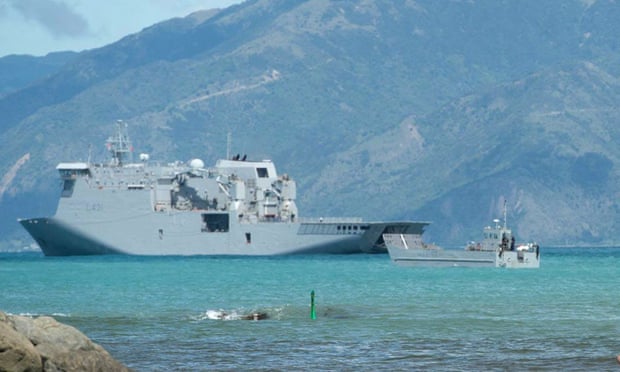New Zealand and Fiji have signed a defence agreement to strengthen military training and maritime security, that comes amid rising tensions over security in the region.
The agreement, signed by New Zealand’s defence minister, Andrew Little, and Fijian minister for home affairs and immigration, Pio Tikoduadua, in Suva on Wednesday, sets a legal framework for military cooperation between the two countries in each other’s territories. The agreement will also address disaster and humanitarian response coordination, and the challenges of climate change.

Little said the deal “reflects the value New Zealand places on our relationship with Fiji”, adding it was important for the two militaries to work together more effectively.
It comes as the US, New Zealand and Australia push to build stronger security ties with Pacific nations, as they attempt to offer an alternative to China’s growing influence in the region. Last month the US and Papua New Guinea signed a defence and maritime cooperation agreement.
In 2022, Solomon Islands signed a security pact with China but Beijing failed to secure a broader regional security deal.
“Beijing’s success in signing the China-Solomon Islands security deal last year has kind of put a chill on other Pacific Island nations doing the same, especially if not balanced by deals with Australia, New Zealand, or the United States,” said Derek Grossman, a senior defense analyst at the RAND Corporation.
READ MORE
- Why NZ's role in the Pacific is more crucial than ever before
- Solomon Islands backs down on plans to build Chinese military base in the Pacific
- On The Panic In The Pacific Over China
- China signs deal with Samoa; Fiji leader meets with Australian minister
Last week, Fiji’s prime minister, Sitiveni Rabuka, signalled the country’s intention to shift away from a policing agreement reached with China more than a decade ago, that had been suspended since he came into office in January. During a visit to Wellington, Rabuka said the 2011 agreement was now under review.
“If our systems and our values differ, what cooperation can we get from them? We need to look at that again before we decide whether we go back to it, or if we continue the way that we have in the past by cooperating with those who have similar democratic values and systems,” Rabuka reportedly said in Wellington last week.
Move comes as US and China push to build security links in the Pacific, and after Fiji said it was reviewing a policing deal with Beijing
Under the policing agreement, China provided training as well as supplies to support Fijian police forces.
Donations from China to Fiji included anti-riot gear, traffic command vehicles, office equipment, radio communication equipment, fibreglass, rubber boats for rescue operations, and other materials.
Police officers from China were deployed to Fiji on attachment programs for periods of 3 to 6 months, the Fijian police force said in 2021, though it was not immediately clear where they were stationed. In 2018, a small group of Fijian police officiers were also given training in China on drug-trafficking cases, according to Chinese state media.
Grossman said Fiji’s move towards cancelling its policing agreement with China was in part due to a desire to “prioritise working with like-minded democratic nations like New Zealand and Australia”.
He added the Fiji-New Zealand defence deal “will allow Kiwi forces to add capacity to Fiji and expose Suva to new technologies and enhance interoperability”.
Samantha Custer, director of policy at the University of William and Mary’s AidData China Research program, said Fiji’s moves to distance itself from Beijing may have wider repercussions in the region.
“The buyer’s remorse we see playing out in Fiji right now may spread to other parts of the region in future as countries rethink the trade offs of their security cooperation agreements and training with the PRC,” she said.




